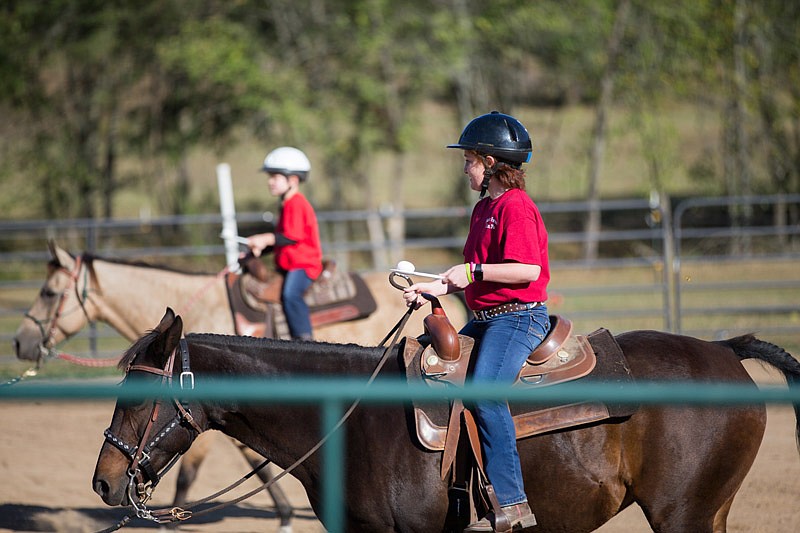Mustangs are feral American horses that haven't learned to trust people. These wild creatures of western lore have a lot in common with the nation's military veterans: They have unique personal backgrounds, and though some have been through traumatic experiences, they can help each other learn to trust, share and heal.
Healing Horses Therapeutic Riding Program in Linn - which celebrated its 10th anniversary Saturday - has added a veterans' horse riding and mustang training program, known as Horses for Heroes, to service those with post-traumatic stress disorder, physical injuries or other reasons to make new companions among a species that has partnered with American soldiers since the Revolutionary War.
Horses for Heroes is funded through Veterans United and private donations. The biggest challenge in starting the new program thus far is simply finding participants.
Healing Horses Executive Director Amy DeCramer said the program will begin "as soon as we get veterans."
"It's up and ready to go," DeCramer said. "We have five spots available for the veterans to ride for 16 weeks at no charge. Our plan is to always be able to offer the veterans' program free of charge because we don't feel like after serving our country they should have to pay for these services."
Healing Horses has a ready stable of different horses to fit each veteran's needs. Other than the mustang and her foal, the herd of fully trained therapeutic staff members includes calm quarter horses, nimble American saddlebreds, pretty paint horses, flashy Tennessee walkers and a big Belgian draft horse for heavier riders.
"(The veterans) can work with any horse on the property," DeCramer said. "All of the horses have learned basic fundamentals."
DeCramer said veterans who have experienced emotional trauma can spend time with a soothing and caring horse, while those with physical disabilities can gallop on a high-speed animal. Veterans with PTSD are encouraged to try the mustang training program, in which participants work on the ground in a round pen training a mustang to work with people, building trust and respect.
"Veterans who suffer from PTSD can have a lot of trust issues," DeCramer said. "Mustangs (also) have major trust issues with people because they are not used to them. When we bring veterans together in a round pen with a wild mustang, they learn how to train them and learn how to get that first touch, learning to build that trust and that bond. It's amazing. There are veterans who talked at our conference who said it saved their life."
Veterans in Linn will work with a mustang that was saved from slaughter when Healing Horses adopted the mare named Navi - short for the Navajo, whose reservation she was raised on. Navi has since birthed a foal named Tehya - a Navajo word for precious - and she will also be available to train in the corral.
Healing Horses Therapeutic Riding Program already services 31 people ages 3 and older with disabilities and 23 children without disabilities. The program focuses on emotional, social and physical challenges that can be improved by working with horses. Students learn the fundamentals of horsemanship and can advance to skills like barrel racing and western pleasure riding.
Therapeutic riding has been shown to provide improved mental health, happiness and self-confidence while teaching trust, compassion and patience. Issuing verbal directions to the horses can help with speech development. Experiencing a horse's walking motion can help those with physical disabilities improve their own gait, loosen tight or spastic muscles, and ease blood circulation in paralyzed equestrians.
"There's 3,000 muscle impulses per 30-minute riding session," DeCramer said. "The kids are just having fun riding a horse, but they are getting so much benefit out of it."
DeCramer founded Healing Horses as a 501 (c)(3) nonprofit organization 10 years ago after she graduated from Lincoln University with a degree in animal science and completed certification through the Professional Association of Therapeutic Horsemanship International. She started offering services with two of her own horses, two volunteers and two therapeutic students. Now she has about 20 volunteers and 16 horses.
Although it has been a big job, operating the organization remains a lifelong dream DeCramer is proud to have grown into a reality.
"It's always, from the time I was little, what I wanted to do," she said. "Horses were always my passion growing up. I got my first horse when I was 8 and just kind of flourished from there. I knew as I got older that I wanted to do something to help kids. It was mostly children. I wanted to help little children with disabilities, but the more I got into the program, there are so many adults, veterans and so many other people within our industry who need the assistance that it broadened my whole horizons."

